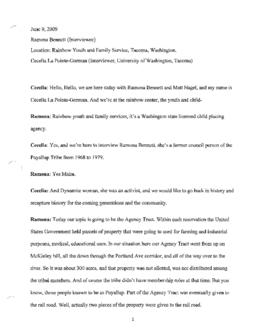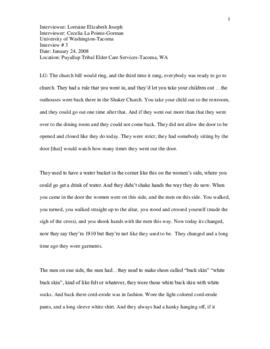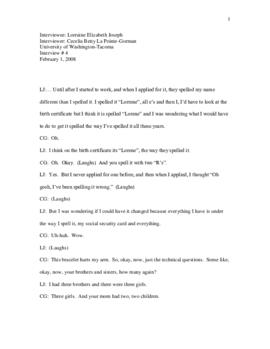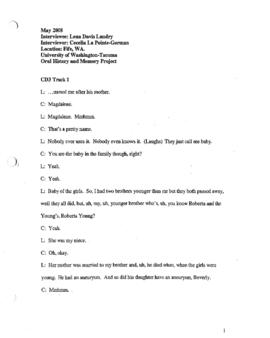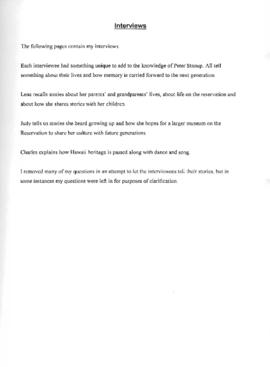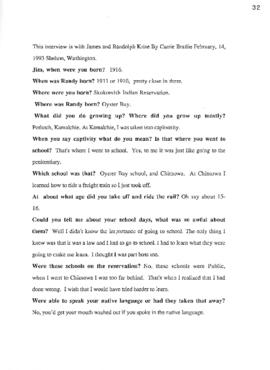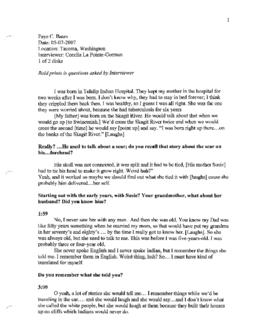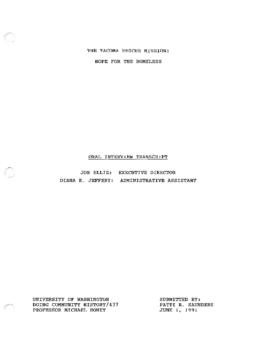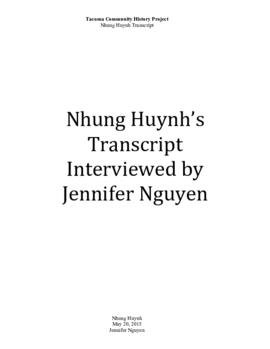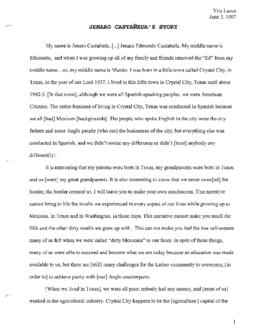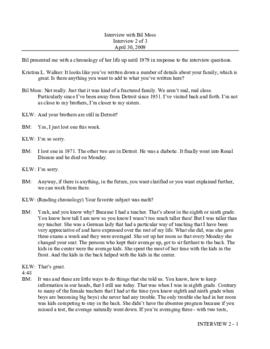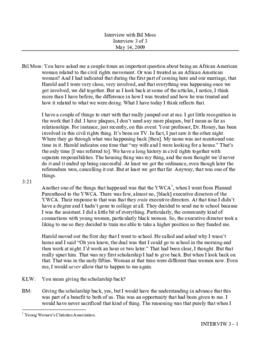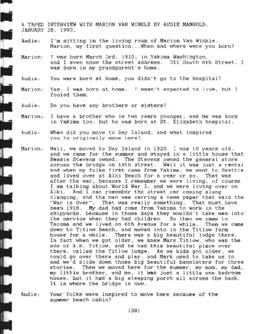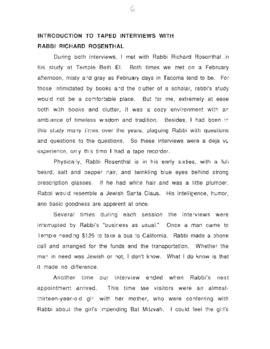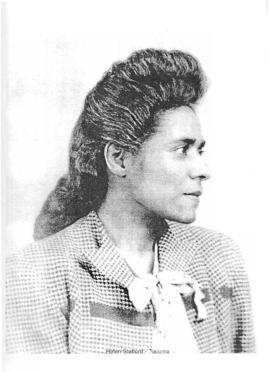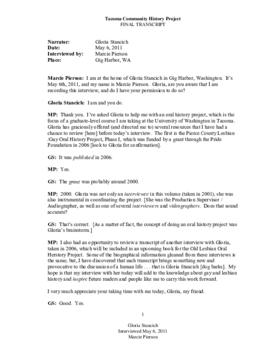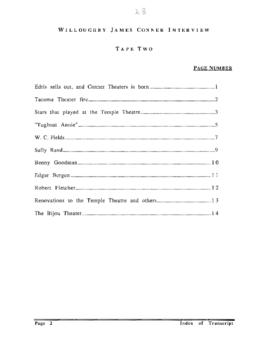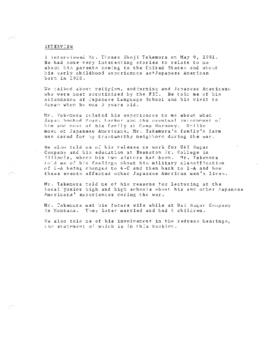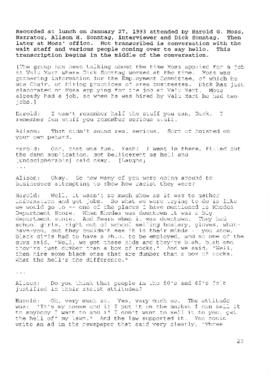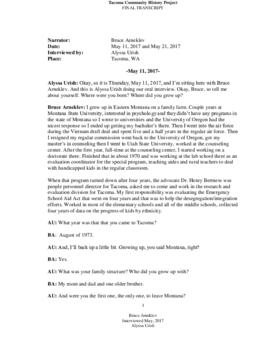Showing 230 results
Collections153 results with digital objects Show results with digital objects
Lorraine Elizabeth Joseph: Puyallup Tribal Elder
- File
- 2008
Oral history interview with Lorraine E. Joseph by Cecelia La Pointe-Gorman conducted January-February 2008. Puyallup tribal elder Lorraine Joseph shares the history of the Indian Shaker Church and discusses how faith and prayer have shaped her life.
- Series
- File
- 1992
Oral history interviews with Leonard W. Holden and Julius Jahn by Juanita Hembrow conducted 02/1992. Leonard Holden, founder of the Tacoma Friends Meeting, and Julius Jahn, a long-time member of the Religious Society of Friends, talk about the history of the Quakers and reflect on the personal experiences and revelations that inspired them to become pacifists and Conscientious Objectors. Holden shares his efforts in establishing a permanent Quaker meeting place in the Tacoma area, and Jahn describes his experiences with various Quaker groups and sects throughout the United States. Both men expound on the various services and humanitarian projects that the Tacoma Friends Meeting has been involved in, from draft counseling services to collaborative efforts with other churches to rehabilitate low-income housing.
- Item
- 2007
Oral history interview with Jenaro Castaneda by Yris Lance conducted April-May 2007. Jenaro Castaneda, a former migrant worker, describes life growing up in a post-World War II farm labor camp and comments on the social barriers he has faced as a Mexican-American. He also touches on his work with the Washington State Office of Minority and Womens Business Enterprises and expresses his hopes for greater recognition and understanding of Washingtons minority communities.
Sisters of Providence & Sister Mary Francis Cabrini Rohr
- File
- 1994
Oral history interview with Mary Cabrini Rohr by Connie M. Smith conducted 02/1994. Sister Mary Cabrini Rohr (Frances Rohr, 1910-1997) discusses her decade-spanning nursing and teaching career, including her time as director of the School of Nursing at Providence St. Peter Hospital in Olympia, Washington. Special focus is given to the schools 1954 changeover from a three-year professional program to a one-year practical program, a transition that Sister Cabrini personally oversaw.
Tacoma Community History UWT Student Projects
- CAC4003
In 1990, the Interdisciplinary Arts and Sciences Program at the University of Washington Tacoma began offering oral history classes at the undergraduate and graduate level. Primarily led by Professor Michael K. Honey, students enrolled in these courses conducted oral histories that document local churches, labor unions, ethnic communities, neighborhoods, businesses, and civic leaders in Tacoma and the South Puget Sound.
Actions Speak Louder Than Words: Helen Cecile Beck Stafford
- Item
- 1993
Oral history interview with Helen Stafford by Helen I. Gilmore conducted 02/06/1993. Community leader Helen Stafford shares her life story, describing her childhood in Kansas and her experiences as a young African-American woman in Depression-era Tacoma. Reflecting back on over sixty years of civic involvement, Stafford comments on her work with the Matron's Club, the NAACP, the Alpha Kappa Alpha sorority, and the Washington Public Employees Association labor union. She also provides numerous insights into the changing face of Tacoma after World War II.
Splendid Gestures: Gloria Stancich and the Gay/Lesbian Community in Tacoma
- Item
- 2011
Oral history interview with Gloria Stancich by Marcie C. Pierson conducted 05/06/2011. Includes highlights from the personal story of Gloria Stancich, longtime civil rights activist and community leader, are discussed and placed in historical context. An active participant in numerous LGBTQ organizations, Stancich describes her path to civic involvement and personal acceptance, which includes a marriage, divorce, and eventual coming out to her son and family.
Oral history interview with Thomas Shoji Takemura
- Item
- 1991
Oral history interview with Thomas Shoji Takemura by Susan Stout conducted 05/09/1991. The interview recounts Thomas Shoji Takemura's early childhood and family life on a truck gardening farm in Fife, Washington before the start of the Second World War, as well as their forced evacuation to the Assembly Center in Puyallup, Washington. Takemura's experience of camp life is recalled in some detail. During this time, neighbors agreed to take care of the family's property. Takemura eventually obtained a release to work at a U & I factory processing sugar beets in Chinook, Montana, where he met his future wife. He also discusses his involvement in the national redress movement and related lecturing at local area schools.
- Series
- Series
- Series
Perspectives on Tacoma School Desegregation: From Family Values to Program Evaluation
- Item
- 2017
Oral history interview with Bruce Arneklev by Alyssa Urish conducted 05/11/2017,05/21/2017. Born in rural, eastern Montana, Bruce Arneklev, 79, can be seen as an unlikely match to have led the Tacoma School District's desegregation program evaluation in the 1970s. Arneklev earned his bachelor's and master's degrees at the University of Oregon and his Educational Doctorate in educational psychology at Utah State University before moving out with his family of five for an evaluation role with the Tacoma School District. Arneklev was hired to evaluate the district's Emergency School Aid Act for its first four years, 1973-1977. ESAA was a federal program that funded school desegregation efforts. Tacoma began voluntarily desegregating its schools in 1966 with a limited school choice enrollment for its segregated central-area schools and expanding to district-wide enrollment policies to reduce effects of de facto segregation over the next three years. Arneklev worked for an additional twelve years in the district's evaluation department before working as a school psychologist for ten years, retiring in 2000. He lives in the North End of Tacoma with his wife, Dixie, dog, Charlie and has several children and grandchildren in the Tacoma area.
